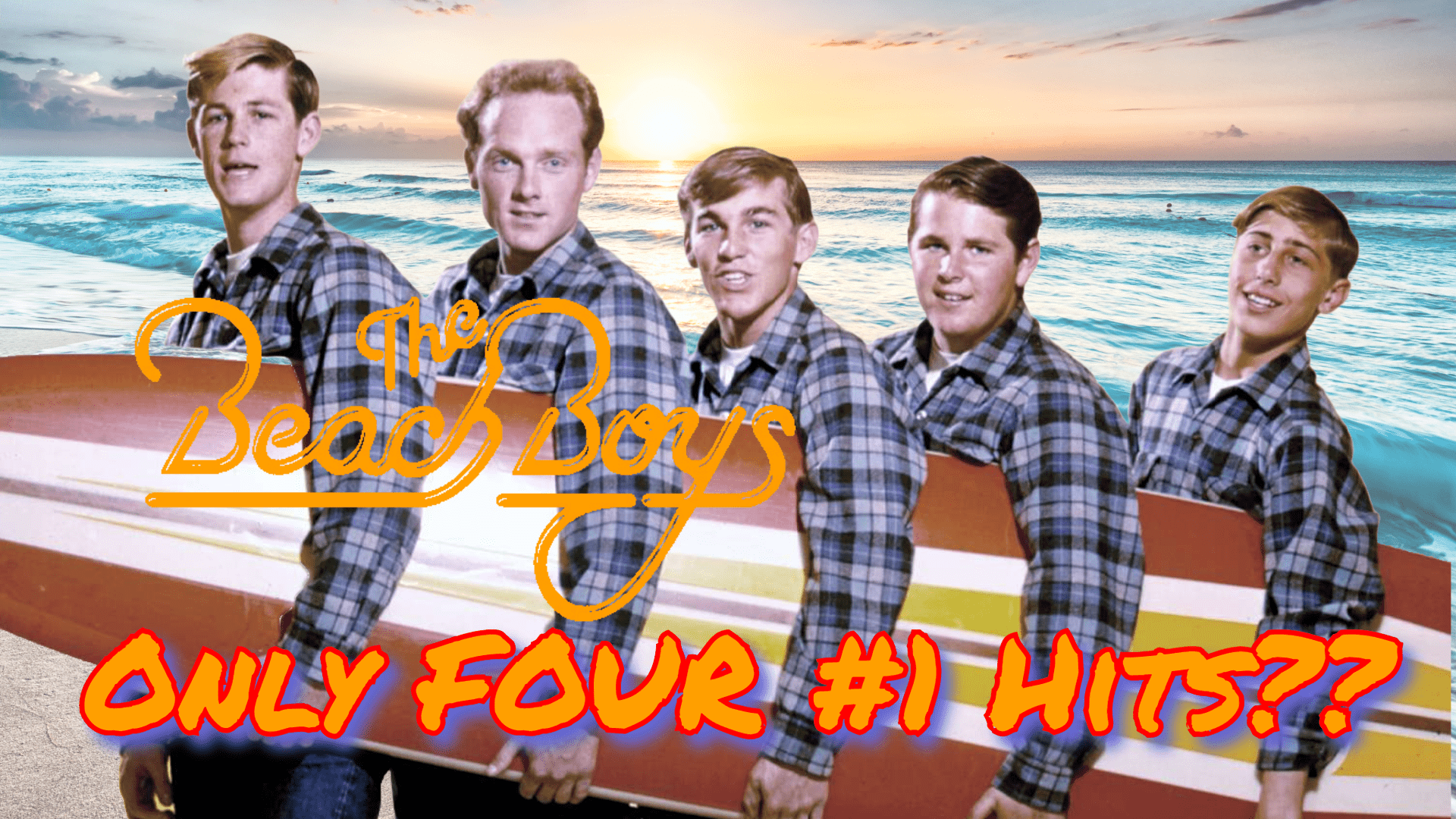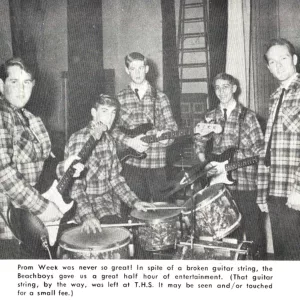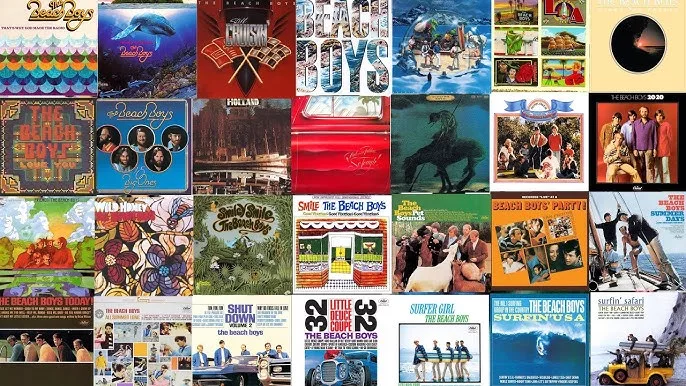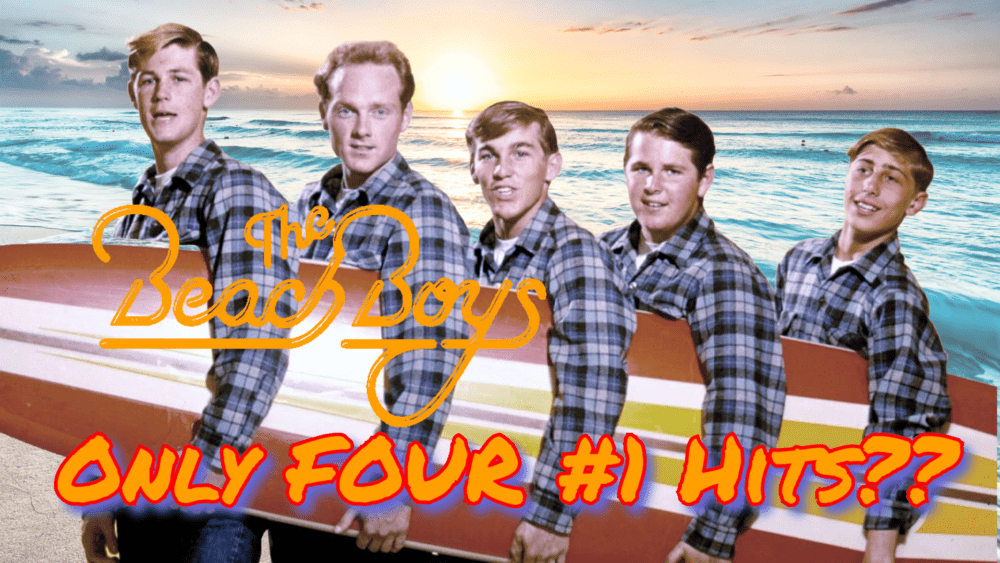
The Beach Boys Only Had 4 Number One Hits
In the annals of American pop music, few bands are as synonymous with the sun-soaked optimism of California as The Beach Boys. Their harmonious melodies, catchy tunes, and evocative lyrics have made them enduring icons of the 1960s. Yet, despite their immense popularity and influence, The Beach Boys surprisingly only managed to secure four number one hits on the Billboard Hot 100 chart throughout their career. This essay aims to delve into the various factors that may have contributed to their relatively modest chart-topping success.
The Beach Boys: An American Institution

First, it’s essential to understand the cultural and musical landscape in which The Beach Boys emerged. Formed in Hawthorne, California, in 1961, the band was initially comprised of brothers Brian, Dennis, and Carl Wilson, their cousin Mike Love, and friend Al Jardine. From their inception, The Beach Boys captured the spirit of American youth culture, blending harmonious vocals with lyrics that celebrated the carefree lifestyle of surfing, cars, and romance.
The 1960s marked a period of unparalleled musical innovation and cultural transformation. From the rise of the British Invasion to the emergence of Motown, the decade saw an explosion of creativity and diversity in popular music. However, amidst this vibrant musical landscape, The Beach Boys faced a myriad of challenges that hindered their quest for chart-topping success. Music was exploding and while the overwhelming message was “there’s no rules” the conservative America that they were entering had a large demographic that longed for good boys singing doo-wop or a capella. Enter the Beach Boys. A group of clean-cut, wholesome young men who could SING. They pushed boundaries, specifically and most intensely with Brian Wilson, who would go on to become a music pioneer in the Beach Boys and beyond.
None of that would stop them from being one of the most exceptional and successful groups in the country, even if they didn’t chart a lot.
The 60s Were COMPETITIVE
One significant factor that may have limited The Beach Boys’ number one hits is the intense competition they faced on the charts during the 1960s. This was an transformative era marked by a musical renaissance, with an abundance of talented artists vying for the top spot. The Beatles, The Rolling Stones, Motown acts like The Supremes, and other British Invasion bands dominated the airwaves and charts with their infectious melodies and innovative sounds. Americans were connecting themselves to Blues, and many British Bands were coming to America to access that Blues sound.
musical renaissance, with an abundance of talented artists vying for the top spot. The Beatles, The Rolling Stones, Motown acts like The Supremes, and other British Invasion bands dominated the airwaves and charts with their infectious melodies and innovative sounds. Americans were connecting themselves to Blues, and many British Bands were coming to America to access that Blues sound.
In such a fiercely competitive environment, securing a number one hit was no easy feat. Despite their undeniable talent and distinctive sound, The Beach Boys found themselves competing against some of the most celebrated acts in music history. While they enjoyed considerable success with songs like “Surfin’ U.S.A.” and “California Girls,” reaching the summit of the charts proved elusive amidst such stiff competition.
Moreover, the rapidly evolving musical landscape meant that tastes and trends were constantly shifting. What may have resonated with audiences one year could quickly fall out of favor the next. The Beach Boys’ signature surf-rock sound, while initially groundbreaking and captivating, risked becoming stale and outdated amidst the ever-changing musical climate. This necessitated a constant reinvention and adaptation on the part of the band, a challenge that few artists were able to navigate successfully.
DEvolution of Musical Direction
Another factor that may have influenced The Beach Boys’ limited number of number one hits is the evolution of their musical direction. While they initially gained fame with their surf-rock anthems and odes to the California lifestyle, the band underwent significant artistic growth and experimentation throughout their career.
One of the most pivotal moments in their musical evolution was the release of the album “Pet Sounds” in 1966. Produced by Brian Wilson, “Pet Sounds” represented a departure from the band’s earlier sound, incorporating complex arrangements, innovative production techniques, and introspective lyrics. Songs like “Wouldn’t It Be Nice” and “God Only Knows” showcased a more mature and sophisticated side of The Beach Boys, earning critical acclaim but perhaps alienating some fans who preferred their earlier, more straightforward surf-rock sound.
While “Pet Sounds” is now hailed as a masterpiece and a landmark in popular music, its initial reception was mixed, and its commercial success did not match the band’s earlier hits. This shift in musical direction may have contributed to The Beach Boys’ difficulty in maintaining their chart-topping success, as they navigated the delicate balance between artistic experimentation and commercial viability. But in this blogger’s opinion, it was Brian Wilson’s chance to shine, and do all of the weird things that we love him for today. Like using a theremin on Good Vibrations…and let’s face it, some of his stuff was weird. Masterful, amazing, and WEIRD.
Industry Dynamics and Marketing Strategies
Beyond the music itself, the intricacies of the music industry likely played a significant role in determining The Beach Boys’ chart success. Record labels, marketing strategies, radio airplay, and promotional efforts all played crucial roles in shaping an artist’s visibility and commercial performance.
During the 1960s, the music industry was undergoing rapid transformation, with the rise of radio and television as powerful mediums for promoting music. Record labels invested heavily in marketing campaigns and promotional activities to ensure their artists received maximum exposure and airplay. For bands like The Beach Boys, who relied on the support of their label and industry connections, securing favorable treatment from radio programmers and music journalists was essential for achieving chart success.
However, despite their best efforts, The Beach Boys faced challenges in maintaining consistent chart-topping success. As tastes and trends in popular music shifted, staying relevant and capturing the attention of audiences became increasingly difficult. Moreover, internal tensions within the band, including creative differences and personal conflicts, may have also impacted their ability to produce hit singles consistently.
The Enduring Legacy of The Beach Boys

Despite their relatively limited number of number one hits, The Beach Boys’ influence and legacy in popular music remain indelible. Their harmonious vocal blend, innovative production techniques, and evocative lyrics continue to inspire generations of musicians and listeners alike.
Songs like “Good Vibrations,” “Wouldn’t It Be Nice,” and “God Only Knows” have stood the test of time, earning their place in the pantheon of classic pop music. The Beach Boys’ ability to capture the essence of California’s sun-drenched shores and youthful exuberance remains unmatched, ensuring their status as cultural icons for decades to come.
In conclusion, while The Beach Boys may have only secured four number one hits on the Billboard Hot 100 chart, their impact on popular music transcends mere chart positions. Their enduring legacy as purveyors of the quintessential California sound, coupled with their musical innovation and artistic experimentation, solidifies their place in music history as one of the greatest bands of all time.
Some of you might be saying “Hold up, LEGENDS!!! The Beach Boys had FIVE chart topping hits, with the Fat Boys on Wipeout in 1987“…we’re not counting that since it was a previously released song, and was not purely a Beach Boys venture. It’s The Fat Boys…remember them? Yeah most people don’t, they were a kitchy, in-and-out feature in the 80s.)
[Here](https://www.youtube.com/watch?v=2s4slliAtQU) is an example of one of The Beach Boys’ iconic hits, “Good Vibrations.”






